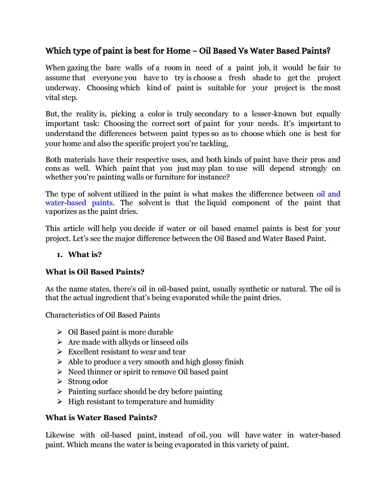When it comes to giving your home a fresh coat of color, the type of paint you choose is crucial. Oil-based paints have been a traditional favorite for their rich finish and durability. In this article, we delve into the world of oil paints, examining their significance, benefits, and potential drawbacks for home use.
Understanding the Basics of Oil-Based Paint
Oil-based paint is renowned for its sturdy composition. Its formulation, which typically includes a base of linseed oil, natural or synthetic resins, and solvents, creates a tough film upon drying. This resilience is part of the advantage of oil-based paint, contributing to its popularity in various applications within the home.
The Historical Significance of Oil-Based Paints
Historically, oil paints have played a pivotal role in the evolution of artistic and decorative finishes. They date back centuries and have been the medium of choice for both master artists and home decorators alike, prized for the depth and longevity they impart to each work.
Advantages of Oil-Based Paint
The preference for oil-based paints is not unfounded. Several attributes position them as the go-to choice for particular painting needs.
Longevity: Does Oil-Based Paint Last Longer Than Latex?
One of the standout benefits of oil-based paint is its longevity. When asking, “does oil-based paint last longer than latex?”, the answer is often a resounding yes. Its robust film-forming capability leads to a long-lasting finish that resists wear and tear effectively.
Durability: Is Oil-Based Paint Better for Exterior Applications?
The durability of oil-based paints is another strong suit. When questioning if oil-based paint is better for exterior applications, one must consider its resistance to the elements. Its tough finish stands up well to wind, rain, and fluctuating temperatures, making it a fitting choice for exterior surfaces.
Aesthetic Appeal: The Unique Finish of Oil-Based Paints
The aesthetic appeal of oil paints is undeniable. They offer a lustrous finish that water-based paints struggle to match. The depth and richness of color achieved with oil-based products can elevate the appearance of trim, furniture, and cabinets.
Disadvantages of Oil-Based Paint
Despite their strengths, oil-based paints are not without their drawbacks, which must be considered before selecting them for a project.
Environmental and Health Considerations
One of the prominent disadvantages of oil-based paints is their environmental and health impact. The high levels of volatile organic compounds (VOCs) they emit can affect indoor air quality and pose risks to the health of the inhabitants.
Disadvantages of Oil Paint on Walls: Challenges in Application and Maintenance
When it comes to walls, the disadvantages of oil paint become more pronounced. The slow drying time and labor-intensive application can be off-putting, and maintenance often requires the use of harsh chemicals for cleaning and touch-ups.
Drying Time and Practical Implications for Home Projects
The extended drying time of oil-based paints can also present practical challenges for home projects. Planning becomes essential to accommodate the longer periods needed before a second coat can be applied or the area can be put back into use.
Comparing Oil-Based and Water-Based Paints
In the debate of oil versus water-based paints, understanding the core differences and their implications on your project is key.
Difference Between Oil and Latex Paint
The difference between oil and latex paint lies in their base; oil paints use an oil-based solvent, while latex paints are water-based. This fundamental distinction affects drying time, ease of application, and the flexibility of the paint film.
Difference Between Oil-Based and Water-Based Paint: Which is Right for You?
Choosing between oil-based and water-based paint depends on the project at hand. Consider the surface, the environment, and the finish you desire. While oil paints may provide a durable and attractive finish, water-based paints offer easier cleanup and faster re-coat times.
Application of Oil-Based Paint in Different Settings
The suitability of oil-based paints varies depending on the setting and the specific requirements of the space or item being painted.
Can You Use Oil-Based Paint Outside? Pros and Cons
When considering, “can you use oil-based paint outside?”, the answer is yes, with certain advantages such as robustness and longevity. However, it’s important to weigh these against the slower drying time and potential environmental concerns.
Choosing the Right Paint for Different Areas of the Home
- Trim and Moldings: Oil-based paints excel here, providing a smooth and durable finish.
- Kitchen and Bathrooms: The resistance to moisture makes oil-based paints a good choice, though ventilation is important due to fumes.
- Living Areas and Bedrooms: Water-based paints may be preferable for their quicker drying time and lower VOC content.
Conclusion: Balancing the Advantages and Disadvantages of Oil-Based Paints
Understanding the full spectrum of characteristics attributed to oil-based paints is essential for making an informed decision for your home.
Summarizing the Benefits of Oil-Based Paint for Home Projects
The benefits of oil-based paint, such as durability and a superior finish, make it a compelling choice for specific applications, particularly where longevity is a priority.
When it comes to painting your home, selecting the right type of paint is crucial. If you’re considering oil-based paints, it’s worth exploring their advantages and limitations in detail. For a comprehensive understanding, our article on the pros and cons of oil-based paint for your home can provide you with the necessary insights. Additionally, if you’re curious about other paint types, we have articles that discuss the pros and cons of milk paint, as well as the pros and cons of chalk paint for furniture. And for those weighing up oil paint against other options, our comparison of latex vs. oil paint pros and cons might help in making an informed decision.
Making an Informed Decision for Your Next Home Painting Project
In conclusion, balancing the advantages and disadvantages of oil-based paints is key. Your decision should align with your project’s needs, health considerations, and environmental impact, ensuring a result that is both beautiful and responsible.


